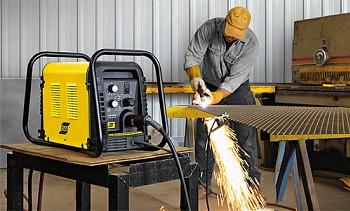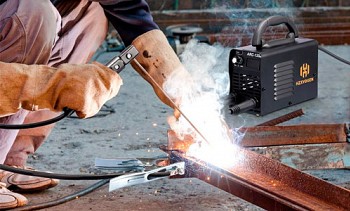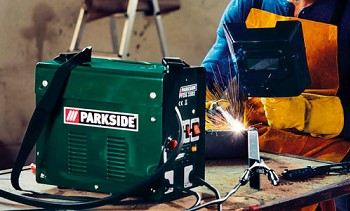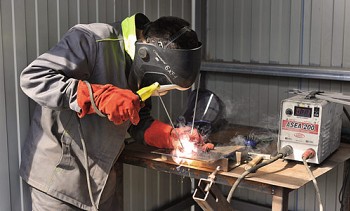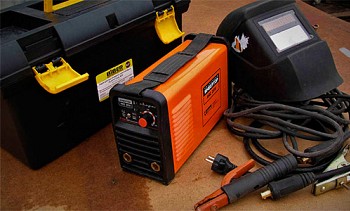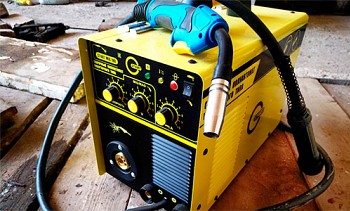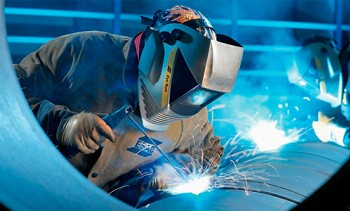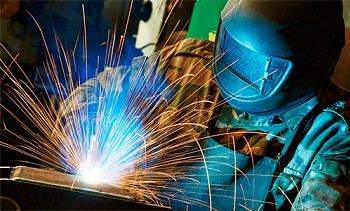Inverter technology, including diode bridges and circuit boards with keys, allows you to receive a direct current that has passed a preliminary increase in frequency. Due to this, the welding arc burns more steadily, and the seams are formed smooth and durable. The equipment itself is compact in size. We have prepared a rating of welding inverters of all categories, which will help to understand the differences between the devices and choose the best one for home or professional activity. The material has been compiled taking into account user feedback and evaluation of product characteristics.

The selection of goods was carried out on the basis of reviews, opinions and ratings of users posted on various resources on the Internet. All information is taken from public sources. We do not cooperate with manufacturers and trademarks and do not call for the purchase of certain products. The article is for informational purposes only.
Which welding inverter are the best to use
Before moving on to the TOP of the best inverter machines, let's look at their varieties in design, principle of operation and scope of use.
Inverter for manual arc welding (MMA)
Principle of operation. Inverters for RDS are carried out in a single housing and differ in compact dimensions within 30x20x15 cm. Most often they weigh 3-6 kg and are convenient for working at heights or along a long structure. The welder simply hangs the machine on his shoulder and moves with it. Inside the inverter there is a step-down transformer, a key board and a diode bridge. Receiving an alternating current of 220 or 380 V from the network, the equipment increases its frequency by a factor of hundreds and converts it into direct current.
MMA inverters are available with two connectors, to which the holder and ground cables are connected. A clamp with a value of “-” clings to the product. A coated electrode is attached to the "+". Contact closure leads to the excitation of an electric arc. The distance between the end of the electrode and the surface of the product must be maintained within 2-5 mm so that the rod does not stick. The filler metal fills the weld pool, forming a seam. The electrode coating, when melted, emits a gas that protects the molten metal from the external environment.

Scheme of the manual arc welding process (MMA).
In which case it is better to use. Due to its simplicity and compactness, MMA inverters are often used in the country, in the courtyard of a private house and small workshops. But it turns out to work slowly (you need to constantly change the electrodes, clean the seams from the slag crust), so it is suitable for tasks where the final result and profitability are priority, rather than manufacturing time (make a fence yourself, weld a loop on the gate, make a greenhouse, etc.) . d.).

Inverter for manual arc welding.
Inverter for semi-automatic welding (MIG / MAG)
Principle of operation. MIG / MAG inverters come in a single housing or separate with a feed mechanism. The wire wound on a babin here plays the role of an electrode, closing the circuit to form an electric arc. But since the additive is supplied continuously from the drum, the seams are long and smooth, without obvious transitions. The welder is equipped with a torch, inside which current, wire and protective gas are supplied.The latter can be inert (argon, helium) or with active protection (carbon dioxide). The advantage of MIG inverters is fast seam execution speed and high quality joints. The absence of slag crust does not require subsequent stripping.

Semi-automatic welding process diagram (MIG / MAG).
In which case it is better to use. Such equipment is suitable for car body repair, mass production of barbecues, doors, gates, containers. But you need to be prepared for the additional costs of a gas cylinder.

Inverter for semi-automatic welding.
Inverter for TIG welding
Principle of operation. Inverters for TIG welding are very similar to models for MMA, only they have a built-in unit for supplying gas and a chip for connecting the torch control connector. Welding is carried out by a non-consumable electrode (usually tungsten with impurities). Due to the sharp sharpening and the constant arc distance, the seam is narrow and even. An inert gas (argon, helium) supplied from the nozzle protects the weld pool from the external environment. The surface of the joint does not need to be cleaned and machined.
Such inverters can operate on direct or alternating current. In the first case, this makes it possible to weld stainless and black steel, cast iron. In the second case, excellent seams on aluminum, copper are obtained.

Diagram of the argon arc welding process (TIG).
In which case it is better to use. Buy a TIG inverter is practical for the manufacture of structures made of stainless steel or non-ferrous metals. This is in demand at large and small enterprises of the chemical and food industries, car services (repair of bumper arches on SUVs, welding cracks in the crankcase, cooling units), with the release of heated towel rails.

Inverter for argon arc welding.
Universal welding inverters
This inverter category contains equipment that combines several welding methods. For example, there are devices for working with coated electrodes and wire feed from a coil (MMA + MIG). The housing has separate connectors for connecting a semiautomatic burner and an electrode holder.
Such an inverter is in demand for auto repair or for the manufacture of metal structures where a high welding speed is required, but occasionally you need to cut something with electric welding or a seam in an uncomfortable place (it’s not convenient to crawl with a burner, and you can bend and insert a thin electrode).
There are also inverters MMA + TIG. They can have a full-fledged connector for attaching an argon burner with a button (pressing a key starts simultaneously supplying gas and voltage), or a TIG burner is attached only optionally. In the second case, a valve model is required where gas is supplied by opening the valve, and to ignite the electrode, touch it on the surface. It is less convenient and suitable for periodic stainless steel welding. For serial production of products, you need to buy an inverter with separate connectors and a built-in burner. The presence of MMA welding will allow boiling ferrous metal 10-20 mm thick if necessary.

The best welding inverters for manual arc welding
Now we turn to the review of the best models for the manual arc method (RDS). This is the most inexpensive type of welding, requiring only the purchase of coated electrodes.
FUBAG IR 200
The MMA inverter has a welding current range of 30-200 A and is intended for manual arc welding with coated electrodes with diameters from 1.6 to 5.0 mm. The model weighs only 4.5 kg, so carrying it on the shoulder with the help of a belt from the kit will not be a problem. Together with the device, two cables 1.2 and 1.8 m with a holder and connectors are provided. Beginners will like the “Fast and the Furious” and “Anti-sticking” features.


+ Pros of FUBAG IR 200
- It easily cooks “four” at normal voltage in the network.
- Good value for money.
Small error of volts and amperes within 1-2%. - During assembly, everything is adjusted neatly and without gaps.

- Cons FUBAG IR 200
- Bayonets in the nests are staggering.
- Many welders do not have enough cable lengths.
- There is no handle, and it is inconvenient to rearrange for a long belt.
- It is delivered without a case.
Output. The reliability rating of welding inverters was headed by goods from the German manufacturer Fubag, which is confirmed by numerous customer reviews, which gave him 5 stars in this category. This is a hardy device that can withstand not only home use, but also construction conditions. Having bought it, you rarely have to contact the service for repair.
Resanta SAI 220 65/3
Continues the rating model from the manufacturer Resanta. The device operates on an input voltage of 140-260 V and consumes 6.6 kW. Welding current is generated in the range of 10-220 A. A slight excitation of the electric arc is possible due to idling of 85 V. Welding of thin metal is facilitated by the Anti-stick function. The inverter is convenient to store thanks to the compact dimensions of 27x17x12 cm.


+ Pros Resant SAI 220 65/3
- Overheating protection is provided.
- Infinitely adjustable current.
- Little sensitive to lower incoming voltage.
- With it, smooth seams without burns are obtained.

- Cons Resanta SAI 220 65/3
- Overheating protection is provided.
- Infinitely adjustable current.
Little sensitive to lower incoming voltage. - With it, smooth seams without burns are obtained.
Output. This inverter for RDS stands out with the possibility of welding with an electrode with a diameter of 5 mm. Although other manufacturers also declare such a possibility in the characteristics of the product, but in fact their performance is lower (maximum 4.0 mm). The same model is really capable of melting such a section and is suitable for welding 5-16 mm thick iron or surfacing for subsequent turning.
Gigant WM MMA-220
The Russian brand Gigant WM launches a 220 A MMA inverter with a convenient transport handle, infinitely adjustable current strength and a bright screen. Cables with a cross section of 16 mm² are supplied. Their core is made of copper, so longer work is possible. The PV of the inverter itself is 70%. For beginners, the Fast and Furious, Hot Start, and Anti-Stick functions are available.


+ Pros Gigant WM MMA-220
- Screen for fine tuning amperes.
- Side protection front panel.
- Handle for shifting in place.
- Overheat protection.
- Steady arc.

- Cons Gigant WM MMA-220
- Cable connectors do not hold well in connectors.
- The wires from the kit require replacement due to the short length.
- Loud fan operation.
Output. This inverter for manual welding with coated electrodes is the best in terms of strength. The manufacturer endowed it with a completely metal case (including the front panel), which reliably protects the microcircuit from shock. Such a device can withstand falls from a height of 1 m and will last a long time, despite the harsh operating conditions.
Svarog ARC 205B (Z203)
And here is a professional class product. The inverter has a digital display and two controls on the front panel. Light indication indicates the presence of a network and overheating. Model weighs 8 kg and is equipped with a short handle. Additionally, you can attach the shoulder strap, for which slots are provided. The range of welding current is 10-200 A. At idle, the device produces 63 V.


+ Pros Svarog ARC 205B (Z203)
- Minimum metal spatter.
- Simple arc excitation.
- There is protection against overheating.
- The claimed characteristics correspond to real ones.

- Cons Svarog ARC 205B (Z203)
- High price.
- The marked out marking does not coincide with the digital designation of 10 A.
- The “twist” flywheel may rub against the panel.
Output. The MMA inverter is notable for long cables of 3 m each, designed to connect the mass and holder. Their cross section is 50 mm², so the core does not overheat and provides full current transfer without loss. The apparatus also has an adjustment of “Fast and the Furious” from 1 to 10 A, where the welder himself decides how much it is necessary to increase the welding current occasionally to avoid sticking of the electrode. This opens up even greater opportunities for welding sheet metal with a cross section of 0.8-1.0 mm.
Fast and the Furious 180 VIAM.683151.026-01
Completes this rating category is another domestic product under the brand name “Fast and Furious”. This is an inverter with high legs, which provides comprehensive air cooling. The model can work from a network of 140-250 V. The minimum current is 15 A, and the maximum is 180 A. The case has a degree of protection IP21. Dimensions of the inverter - 29x15x16 cm.


+ Pluses the Fast and the Furious 180 VIAM.683151.026-01
- High open circuit voltage - 70 V.
- Shockproof housing.
- Light weight 4.3 kg.
- Gently cooks and does not spray metal drops.
- Easy setup.

- Cons Fast & Furious 180 VIAM.683151.026-01
- PV at a maximum of only 35%.
- Sold without cables (only two plugs).
- Weak arc ignition, especially on UONI electrodes.
- There is no screen, only a drawn scale.
Output. Inverter has been added to the low power rating. He spends 5.46 kW from the network, while being a professional device with a full range of functions. The goods should be paid attention to the owners of workshops where wiring with a household cross-section of 2.5 mm² is laid.
The best welding inverters for semi-automatic welding
Semiautomatic devices are also built on the basis of transistors with keys, which are boiled with a wire that feeds continuously from the coil. Here are the TOP welding inverters with the capabilities that have already been tested by users and received a positive rating.
Aurora PRO OVERMAN 180 Mosfet 10041
The first place in the ranking is occupied by the semiautomatic device from the Aurora brand. The inverter is available with a Euro connector, so replacing the burner in the future will not be difficult. In the existing cable channel, you can thread the wire from 0.6 to 1.0 mm thick. Idling runs at 42 V. The welding current is adjustable from 40 to 180 A. The MIG semi-automatic weighs 15 kg. The coil is located in a single housing together with the feed mechanism.,


+ Pros Aurora PRO OVERMAN 180 Mosfet 10041
- Do not bite the wire.
- Secure door closure.
- High-quality assembly.
- Easy to customize.

- Cons Aurora PRO OVERMAN 180 Mosfet 10041
- A weight of 15 kg is inconvenient for frequent transportation.
- When power surges in the network up, the welding current "dances" and burns the wire.
- There is no display.
- No pulse welding.
Output. This semi-automatic inverter is recognized as the best due to long-term operation without overheating. Although PV at a maximum current of 60% is declared, but in the reviews, welders report that they can continuously weld metal 5 mm thick. This is practical for semi-professional activities where profit depends on productivity.
Resanta SAIPA 220
The second place is occupied by a semiautomatic device from Resant. The inverter is built on IGBT transistors. The current strength is adjustable within 30-220 A. It is permissible to work with a wire with a diameter of 0-6.1.0 mm. When connected to a power outlet, the semiautomatic device consumes 6.4 kW. PV is 70%. Model weighs 14.7 kg. There are two regulators on the case: current strength and wire feed speed. A light indicator indicates the presence of a network connection and an overheat operation. Included is a 2 m burner with Euro connector and a mass clamp.


+ Pros Resanta SAIPA 220
- Easy to operate.
- In skillful hands, smooth seams are obtained that cannot be distinguished from factory ones.
- Good welding current.
- Cooks with voltage deviation up to -30%.

- Cons Resanta SAIPA 220
- It can only be boiled with gas - not suitable for cored wire.
- Short ground cable - 1.5 m.
- There is no pulse mode.
Output. This is a semiautomatic device for welding MIG with a high welding current of 220 A. At the same time, the inverter is powered from a 220 V household network, therefore it is suitable for a garage or a summer residence. If you need to connect metal 10-20 mm thick, then pay attention to such a device.
Svarog MIG 200 REAL N24002N Black
Our review continues with a semiautomatic device from the Svarog brand. The inverter is notable for its robust housing with rubberized corners, which contributes to better protection in an industrial environment. There is a handle for moving. Coil loading is carried out through the side hatch. Inside, a wire feed mechanism for two rollers is used. The semiautomatic device cooks with a current strength of 30-200 A.The dimensions of the inverter housing are 50x22x37 cm. PV at a maximum of 60% is permissible.


+ Pros Svarog MIG 200 REAL N24002N Black
- Nice to have a seam.
- Excellent penetration of metal.
- There are no streaks or crevices on the back of the connection.
- Suitable for coils of small and medium size (up to 5 kg).
- When you take the burner away from the apparatus, the cable channel does not break.

- Cons Svarog MIG 200 REAL N24002N Black
- With poor electricity in the country (170-190 V) cooks poorly.
- You need to get used to the adjustments.
- High price.
- Buzzing loudly.
Output. We recognized the semi-automatic inverter as the best in view of the wide adjustment possibilities. In addition to the current strength and wire feed speed, the number of volts can be set here. This is convenient for determining the degree of penetrability of the filler metal and will help to create thin or high seams. We recommend a semiautomatic device for critical constructions.
QUATTRO ELEMENTI Multi Pro
In fourth place is the product from an Italian manufacturer. The semiautomatic device is equipped with a removable burner with a Euro-connector, a mass cable, an integrated pulling mechanism. In MIG mode, you can set 2 or 4 measures, depending on the convenience of the welder. The inverter operates both with and without gas, provided that flux-cored wire is used. The maximum weight of the installed coil is 5 kg. The welding current range is 10-190 A.


+ Pros of QUATTRO ELEMENTI Multi Pro
- You can lower the current to 10 A for welding thin metal.
- It cooks evenly with electrodes and in semiautomatic mode.
- Clear instructions included.
- Metal feed rollers.

- Cons QUATTRO ELEMENTI Multi Pro
- Power is lower than declared by 10%.
- 1 m cable
- No gas reducer included.
- Spatter quickly sticks to the metal nozzle.
Output. This inverter is notable for two screens, allowing you to visually control the setting of current strength, feed rate and the number of volts. Using the displayed numbers, the values can be set with maximum accuracy, which facilitates the selection of the welding mode. This semiautomatic device is also able to cook MMA, which will help to stitch in a hard to reach place or even carry out cutting.
SPECIAL MAG170 Invertor
The semiautomatic device with a current strength of 30-160 A completes this category. It belongs to the household class and can be used in a garage, in a country house or at home. The inverter is designed for wire welding with a diameter of 0.6 and 0.8 mm. It can be solid or hollow with powder inside. Case dimensions are 52x29x39 cm, so the model fits freely and the trunk of a passenger car. The kit immediately provides a burner and electrode holder. The efficiency of the welder is 73%.


+ Pros SPECIAL MAG170 Invertor
- Supports welding with and without gas.
- PV at a maximum current of 60%.
- Small dimensions 52x29x39 cm.
- Nozzle 0.6 and 0.8 mm included.

- Cons SPECIAL MAG170 Invertor
- There is no screen.
- Scale adjustment is only approximate.
- Individual burner connector.
- Only for small coils of 2 kg.
Output. This MIG / MAG inverter stands out from the rest at a more affordable price. At the same time, a mask, a brush and a hammer are often attached to the apparatus, as well as 1 kg of copper-plated wire. All this is suitable for a beginner and will provide the necessary to get started. Also, the semiautomatic device has the lowest weight in the rating category - 9.8 kg. This is important if you often need to move around the workshop with the power source, but there is no cart on casters.
The best welding inverters for argon arc welding
When you need neat thin seams on ferrous metal or stainless steel welding, then devices with TIG mode are used. Here are the best inverters with such equipment.
RESANTA SAI-230 HELL
This is an inverter with bayonet connectors for MMA welding, as well as a separate input for connecting chips from the TIG torch control button. Thanks to this argon arc, you can start by pressing a key, rather than touching a product. The device gives out a current strength of 230 A and supports working with electrodes with a diameter of up to 4 mm.


+ Pros RESAI SAI-230 HELL
- Strong steel case.
- Affordable cost.
- There is a large supply of power.
- Reliable contact in connectors.
- Uniform welding seam, high strength.

- Cons RESANT SAI-230 HELL
- No display.
- In case of moisture, transistors burn out.
- Welding is carried out only by direct current.
- Short cable.
Output. Welders in reviews praise the machine for quality seams on alloy metals. This is a worthy TIG inverter for those who do not want to overpay for more hyped brands. 70% PV with a current strength of 230 A allows the use of the model not only for domestic purposes.
Svarog REAL TIG 200 W223 93556
The Svarog brand introduced its inverter for argon-arc and manual welding. The model is equipped with a display that allows you to set the current with an accuracy of 1 A. There is a rigid handle for moving equipment. The case is protected at the corners by rubber inserts, which is typical for all products of this manufacturer. Mass cables and torches are connected to tight bayonet connectors, and there is a separate chip for powering the arc control. The inverter works with currents of 10-200 A. The diameter of the tungsten electrode can be from 1.6 to 3.2 mm.


+ Pros Svarog REAL TIG 200 W223 93556
- Contactless ignition.
- High quality welding at any current.
- Light weight 7 kg.
- You can lower the current to 10 A to weld a thin metal.
- Low power consumption 4.83 kW.
- Convenient argon burner included.

- Cons Svarog REAL TIG 200 W223 93556
- The power key is located on the back.
- In MMA mode, “Hot Start” does not work.
- There is no setting of the gas pre-flow time.
Output. This inverter stands out for its stable operation at reduced incoming voltage. Argon arc welding will turn out even at a figure of 160 V. If you have a weak line in your garage or at the cottage, then pay attention to such a TIG device.
Quattro Elementi B 225
The TIG inverter from the Italian brand Quattro Element continues its rating. The welding machine can cook both in argon and coated electrodes. Switching modes is performed by pressing a button on the front panel. The digital display is convenient for fine-tuning the current strength. But the kit does not have a TIG burner. A separate chip for connecting the control is also absent, so it’s possible to set fire to the tungsten electrode only by the contact method (to strike on the surface).


+ Pros of Quattro Elementi B 225
- It is convenient to cook by hanging the inverter on your shoulder.
- Supports TIG and
- There are additional features.
- Digital display for fine adjustment.
- It cooks well with argon at a voltage of 200 V.

- Cons Quattro Elementi B 225
- For argon welding, nothing is included.
- Need wiring in a socket with a cross section of 4 mm².
- It will not work to weld aluminum.
- Contact ignition only.
Output. This TIG inverter is well suited for continuous work in the workshop. Its PV at a maximum current of 225 A is 80%. If you need to assemble metal structures with a steel thickness of 3-5 mm, then a voltage of 150 A will allow you to work without interruptions.
Aurora PRO INTER TIG 200 AC / DC PULSE Mosfet 10052
And here is a more advanced model for argon arc welding. The inverter is made with dimensions of 49x32x30 cm and IP21 housing protection. The current drops to 5 A, allowing you to weld sheet metal with a cross section of 0.6 mm. The maximum value of the welding current is 200 A. The inverter weighs 20 kg and produces an open-circuit voltage of 44 V. PV is 60% permissible. An argon burner (type 26) and a weight cable with a cross section of 50 mm² are supplied. The 2PIN connector provides power to the burner control and allows non-contact ignition.


+ Pros Aurora PRO INTER TIG 200 AC / DC PULSE Mosfet 10052
- There is a digital display.
- Good air cooling.
- Convenient burner with contactless ignition.
- Excellent seams on stainless steel and copper.
- Modes 2 and 4T.

- Cons Aurora PRO INTER TIG 200 AC / DC PULSE Mosfet 10052
- The board displays only the current strength - all complex functions are set “blindly”.
- High price.
- In MMA mode, the declared “Fast and the Furious” is missing.
- Sockets with backlash.
Output. This TIG inverter belongs to the professional category and can operate both on direct and alternating current. Such functionality is useful in a car repair shop or in an enterprise where it is required to cook aluminum and other "capricious" metals. Thanks to argon welding on alternating current, high-quality tight seams will be obtained.
BRIMA TIG-200P AC / DC
The product from the German brand Brima completes our rating of argon inverters. The device is connected to a 220 V network and provides a current strength of 10-200 A. PV at a maximum of 60% is permissible. The equipment does not overload the wiring, since the power is 5 kW. It can be easily powered in the garage or from the outlet in the country. The inverter weighs 25 kg, therefore, implies stationary use. Inside the case 50x35x36 cm air cooling is realized.


+ Pros BRIMA TIG-200P AC / DC
- You can set the exact number of amperes on the screen.
- Fast switching from direct to alternating current.
- Two handles for carrying.
- High legs under the casing for faster heat dissipation.
- Uptime

- Cons BRIMA TIG-200P AC / DC
- High price.
- It's hard to figure out the adjustments.
- Poorly attached ground terminal.
- The burner is not the most convenient.
Output. The TIG inverter is notable for its breadth of settings. Here you can install welding with a pulse, where not only the current strength, but the oscillation frequency will constantly change. The exposure duration and pause length are adjustable. The time for preliminary and subsequent gas supply is set separately. All this is ideal for welding aluminum and thin iron.

